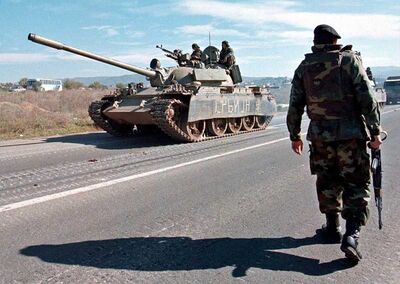Granika Border War: Difference between revisions
No edit summary |
|||
| (One intermediate revision by the same user not shown) | |||
| Line 7: | Line 7: | ||
| date = 14 August 1963 - 22 April 1981 <br>(17 years, 8 months, 9 days) | | date = 14 August 1963 - 22 April 1981 <br>(17 years, 8 months, 9 days) | ||
| place = Border regions of [[Ruvelka]]-[[Syara]] | | place = Border regions of [[Ruvelka]]-[[Syara]] | ||
| result = | | result = Status quo ante bellum | ||
| territory = No major exchange of territory | | territory = No major exchange of territory | ||
| combatant1 = {{flagicon image|RuvelkaFlag.png|border|22px}} [[Ruvelka]] | | combatant1 = {{flagicon image|RuvelkaFlag.png|border|22px}} [[Ruvelka]] | ||
| Line 26: | Line 26: | ||
The border between Syara and Ruvelka had been contested since the collapse of the Arkoennite Empire. The [[Treaty of Debrecen]] which ended the [[Siduri War]] had left much of the disputed regions under Syaran control to the ire of Ruvelka. Following the [[Broken Years]], post-war population growth resulted in significant demographic changes to many areas of the border, raising ethnic tensions mixed with separatist movements who sought independence from both sides such as the [[SDM (Separatist Group)|SDM]] in Zemplen and the Ishkordhur in Imerti. | The border between Syara and Ruvelka had been contested since the collapse of the Arkoennite Empire. The [[Treaty of Debrecen]] which ended the [[Siduri War]] had left much of the disputed regions under Syaran control to the ire of Ruvelka. Following the [[Broken Years]], post-war population growth resulted in significant demographic changes to many areas of the border, raising ethnic tensions mixed with separatist movements who sought independence from both sides such as the [[SDM (Separatist Group)|SDM]] in Zemplen and the Ishkordhur in Imerti. | ||
The largely asymmetric conflict was waged from 1963 to 1981 and consisted mostly of territorial incursions, border skirmishes, and infiltration raids, escalating occasionally into more direct and intense confrontation. Ruvelka, with its emphasis on light infantry and heliborne operations, achieved many notable victories which often included participation from [[Ruvelkan Imperial Fusiliers|Imperial Fusiliders]]. Fighting occasionally escalated into short, high intensity confrontations, such as the [[Seven Day War]] in 1969 and the [[ | The largely asymmetric conflict was waged from 1963 to 1981 and consisted mostly of territorial incursions, border skirmishes, and infiltration raids, escalating occasionally into more direct and intense confrontation. Ruvelka, with its emphasis on light infantry and heliborne operations, achieved many notable victories which often included participation from [[Ruvelkan Imperial Fusiliers|Imperial Fusiliders]]. Fighting occasionally escalated into short, high intensity confrontations, such as the [[Seven Day War]] in 1969 and the [[Hayren War]] in 1980. Despite 17 years of fighting and hundreds of thousands of casualties, no significant amount of territory was exchanged. A lasting ceasefire in April 1981 is typically used to mark the end of the conflict, as the Syaran Republic would collapse into [[Refusal War|civil war]] in 1983. Further territorial conflict between Syara and Ruvelka would continue after the foundation of the Commonality, but were largley conventional by comparison. | ||
==Background== | ==Background== | ||
Latest revision as of 23:02, 8 April 2021
| Granika Border War | |||||||||
|---|---|---|---|---|---|---|---|---|---|
 Syaran troops in Armavir, 1980 | |||||||||
| |||||||||
| Belligerents | |||||||||
|
|
| ||||||||
| Units involved | |||||||||
| Imperial Armed Forces of Ruvelka | Army of the Syaran Republic | ||||||||
| Strength | |||||||||
| 100,000 - 200,000 | 150,000 (1969) | ||||||||
| Casualties and losses | |||||||||
|
20,000-25,000 killed 70,000-230,000 wounded |
11,000-22,000 killed 60,000-150,000 wounded | ||||||||
The Granika Border War was a series of border conflicts fought between of the Republic of Syara and Ruvelka from 1963 to 1981. The war is named after the Granika River which runs from the Zemplen Region to the Sundering Sea, which has historically served as the northern boundary between Syara and Ruvelka, although fighting occurred all across the border.
The border between Syara and Ruvelka had been contested since the collapse of the Arkoennite Empire. The Treaty of Debrecen which ended the Siduri War had left much of the disputed regions under Syaran control to the ire of Ruvelka. Following the Broken Years, post-war population growth resulted in significant demographic changes to many areas of the border, raising ethnic tensions mixed with separatist movements who sought independence from both sides such as the SDM in Zemplen and the Ishkordhur in Imerti.
The largely asymmetric conflict was waged from 1963 to 1981 and consisted mostly of territorial incursions, border skirmishes, and infiltration raids, escalating occasionally into more direct and intense confrontation. Ruvelka, with its emphasis on light infantry and heliborne operations, achieved many notable victories which often included participation from Imperial Fusiliders. Fighting occasionally escalated into short, high intensity confrontations, such as the Seven Day War in 1969 and the Hayren War in 1980. Despite 17 years of fighting and hundreds of thousands of casualties, no significant amount of territory was exchanged. A lasting ceasefire in April 1981 is typically used to mark the end of the conflict, as the Syaran Republic would collapse into civil war in 1983. Further territorial conflict between Syara and Ruvelka would continue after the foundation of the Commonality, but were largley conventional by comparison.